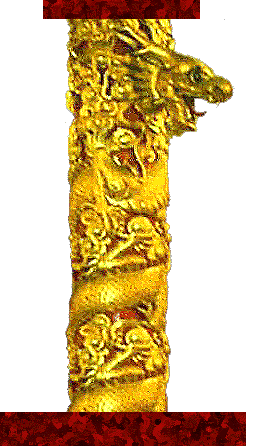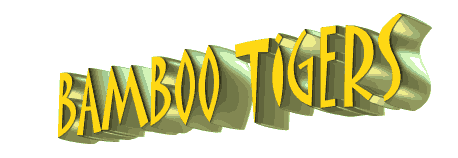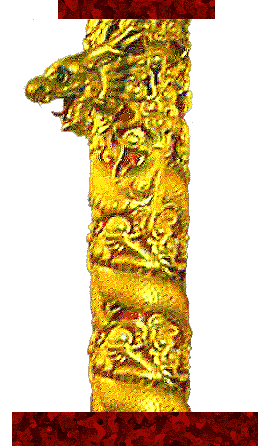| |
A young man who followed the gang pattern throughout his teens made substantially the following lengthy statement about his youth-gang involvement:
"Yeah, I'll talk to you, but you don't let anybody know my name. Maybe I'd get killed, y'know?
"Sure, I speak Cantonese, and also a little bit of Mandarin. I write them both. They share the same written language.
"I don't run around Chinatown much anymore, see? I'm older now. When I was a kid, I was into the gangs. I was 14 when I joined the Wah Ching; that means 'Chinese youth' in English.
"We had a ceremony to make it official. There was a Chinese god on an altar, with a big knife in his hand. I mean, there was a picture of him. He's called Kwan Gung. He was our patron saint. There was some incense. A middle-aged man lit the incense and made a speech to the effect that all the brothers were gathered with some newcomers who were willing to join and willing to respect the elders and follow orders. Then the old guy presented a knife to us. We cut ourselves in the palm and let the blood drip into a bowl. That made us blood brothers. Food was offered to the god--some chicken, some eggs. That was it. They put my name in a book. I was a Wah Ching.
"They don't have the ceremony anymore.
"The gang had maybe 30 or 40 members divided into four groups. The principal leader then was Anton Wong, but he was killed because he fought against the Joe Fong Boys, the Chung Ching Yee, the ones they call Joe Boys now.
"The Wah Ching had an older group, the Anton Wong guys, the people who were in his age bracket, 24 or 25 years old. Then there were the guys maybe two or three years younger, then the ones around 16 to 18, and finally the kids like us, around 14 or 15.
"A lot of other kids hung around with us. They wanted to be Wah Ching, and some were, but you could never be sure because everybody was bunched into tight little groups and stayed to themselves, behind the bookstore, or over at some guy's house, or at school. If you respected somebody, you'd call him a Wah Ching, him and his group. Maybe he wasn't really Wah Ching, but he was doing the same thing you did. Anyway, you liked him, so it was O.K. for him to hang around Jackson Street and certain other areas in Chinatown.
"Lots of trouble started happening in 1976. There was one time when several Wah Ching were on a street corner, and a red car came by with a Joe Boy at the wheel. The Wah Ching had guns and started shooting at the car. Nobody got hurt. The Joe Boys were in opposition to us because of Joe Fong, who was considered a maniac by our guys. He caused a lot of problems and trouble for our people. He started out as a W.C., a Wah Ching, but he didn't fit in. He got into some disagreement with the leadership and broke away. That is what I heard from the older W.C.'s. Then he more or less went over to the Yao Lai.
"The Yao Lai left Chinatown and broke up. The guys still close to Joe Fong went into his new Chung Ching Yee (or Chung Yee) Gang. We called 'em the Joe Fong Boys. After Joe went to jail, they became the Joe Boys, 'the jellybeans,' because of the 'J' and the 'B,' y'know.
"Every weekend, something happened. There were a few shootings, like when the Joe Boys hit Wayne Fung at the gas station. That was a big operation. Eddie Yuen got convicted for it. First-degree murder. This made Wayne's younger brother Dennis crazy with hatred for the Joe Boys.
"There was this Japanese guy about 30 years old. We hung around at his house on Larkin Street. We would all troop up there to play cards and get high. He would always make us put our guns on the table, just in case somebody got too high and went crazy, you know. We had all kinds of guns.
"In 1976, everybody started going to Great Highway along the beach--Wah Ching looking for Joe Boys, and vice versa. Once, we took three or four of our cars cruising around out there. We recognized two or three Joe Boy cars, so we made a U-turn and started shooting. They fired back. It was spontaneous.
"It got so that every time we saw Joe Boys, we beat them up, or, if it was serious enough, we shot at them. They got mad. Sometimes the Joe Boys and Wah Ching met each other and one side didn't have any guns, but the one with guns would shoot anyway. To get even, you would have to drive around and find them walking down the street and start shooting. They did the same thing. After awhile, we packed guns all the time, especially outside Chinatown. You never knew when Joe Boys might drive by. Everybody was looking for everybody else.
"We had trouble everywhere. Even with other guys in Chinatown. The Hop Sing Boys had better guns than we did. They tried to lure some of our guys to join them. They offered them nice guns. A couple of our friends ran away from us because of that. A lot of the Hop Sing Boys were A.B.C.'s. They had a different tradition from us.
"Our group had a dispute with a Hop Sing Boy one time. We went up to his place and called him out for a fair fight. He stood outside the door and yelled: 'Fuck you guys! Man, you come in and shoot the hell out of me!' He had buddies in there and some guns, but we weren't packing any that day. You see, we felt when there were lots of people with you, you didn't need guns. So one of us said, 'What we going to do?' And our leader said, 'Well, we can't let him get away with this, you know.' We went and got guns and came back, but nobody was there. The next day, the tension wasn't so bad. It blew over.
"But our anger at the Joe Boys never blew over. Their even being in Chinatown was an offense to us.
"We bought a lot of guns, not really cheap, but maybe a hundred dollars each. Cheap enough to throw away after you used them. The price wouldn't hurt us. We had individual guns and group guns, too. Everybody had his own, and then we could use the group guns for something special, like if somebody said, 'I need a gun today.'
"Mostly, we would buy them at the gun shows in Vallejo, San Jose, and Mountain View. I did that a lot when I was a kid. You got a fake I.D. with your picture on it because you had to be 18 to buy one. The dealers were usually white, so they weren't too sure about a Chinese kid's age anyway. They had all kinds of guns, from real antiques to German lugers that cost up to a thousand dollars. One time I bought a .22 rifle there.
"We never kept the guns in one special place. I always had about four or five hidden in my house--in the back of the closet or under the bed.
"I remember there was this .380 Astra I liked. Double action. Light. Not too big. I don't know what happened to it, but I think it was used in the 4th of July thing at Ping Yuen. Somebody got shot with it. I was up at some guy's house a few days later. We were playing cards and getting high, and I thought about the .380. I asked where it was, and somebody in the background said it had to be thrown away because it was used. On the 4th, during the shootout, I was out driving around or at a movie or having dinner or something. I don't care who says different; I wasn't there. I drove into Chinatown and ran into this guy, and he said, 'You better get out of here, y'know; there's been a shooting.' I took off.
"I heard about some Wah Ching in a white station wagon driving up Pacific Avenue that evening, who saw Joe Boys walking down the Royal Pacific Motel driveway toward the Ping Yuen project. That's when the first shooting began. Then another group of Wah Ching came around the corner from Grant Avenue and joined some others in front of Ping Yuen and started shooting some more. They all went inside.
"After everything was over, some Ping Boys went around paying their 'permission' money--permission for them to sell firecrackers in Chinatown. Our little group got a couple thousand dollars.
"We had other sources for money. Way back, Anton Wong was the collector. He picked up money from gambling houses. The gambling houses paid off to give face, or respect, to the Wah Ching for being the main rulers in Chinatown. Of course, another reason was for protection. They didn't want anybody to mess up their gambling houses. With the Wah Ching being paid to float around, that wouldn't happen.
"The older Wah Ching associated a lot with even older people like businessmen and restaurant owners. Some of them were Tong members. Those restaurant owners, they go in and out of Tongs, you know. They treated us right mostly because we were in power. The W.C.'s were the most powerful of the gangs. That meant something in Chinatown.
"When we went out to eat, nobody ever saw a bill. We would eat and leave. Some theaters passed out tickets all the time to give us face. At the Sun Sing Theater, we didn't even need tickets. We just walked in. That's power!
"Later on, we started collecting money from stores. Extortion got important in the middle 70's. In the early 70's, we were doing a lot of gung bow. That means to go up to a rich guy you know and ask him for money. He gives you plenty because he's scared or because he knows you're a Wah Ching guy. Our reputation was like that.
"Money came in from Chinese opera companies that came over from Hong Kong and Taiwan to appear in San Francisco. They had to pay a certain face fee to the gang members in order for us to stick around and protect them. After the payment, we would be told to go there. They gave us tickets to places like the Pagoda Theater or, one time, to the Sun Sing Theater, where the shows were. Sometimes our guys even traveled with them from city to city all over the United States and Canada to protect them.
"The Joe Boys once tried to weasel in on that operation. A fight broke out, and they left.
"There was a time in 1973 when a group of people came from New York. They were called the White Eagles. They were very good friends with Anton Wong and knew some other W.C.'s. I don't know why they were in San Francisco. We had a banquet for the opera, the Chinese opera, and they were there. At the Four Seas Restaurant, I think, on Grant Avenue. Up on the second floor.
"I went along for the meal. I ate. We all ate. There was no ceremony, just a big welcome for the opera stars. Everybody sat with his own little group, as usual, but Anton Wong went around the table and drank with everybody. He proposed several toasts.
"There was a lot of violence in the early days. Raymond Leong, a leader of the Yao Lai, got killed. Then Anton Wong. Joe Fong's brother killed him. After Anton died, a power struggle went on for a little while among the older Wah Ching. Then some of them started leaving town for New York and Seattle and places like that. The younger people like us were left with nobody to take care of them.. That's when Hotdog Louie was doing a lot of stuff, trying to make it big.
"Hotdog, Johnny Young, Danny Wong and a couple of others were at the center of the Wah Ching. They pulled a few burglaries up on Russian Hill, wandering around pretending to sell newspapers from house to house. A knock on the door and nobody home meant they could enter at will and take what they wanted.
"Hotdog tried to make himself a big shot, but he never made it big with us. No, he never did become powerful in the Wah Ching, but other people used to accept him as a W.C. leader.
"The W.C.'s were all over the place. There was a New York Wah Ching. And San Francisco. And Los Angeles. There was no Vancouver Wah Ching, but there was another group there. A rumor circulated to the effect that somebody started a Wah Ching Gang in Taiwan. Maybe so. Whenever our people go there, our name is so well known they are welcome. People go back and forth. Taiwan. New York. Hong Kong. Boston. They get assignments in different places--hits, burglaries, whatever.
"Guys from all over show up here, too. They all want to see San Francisco's Chinatown. When they come, we get together, have dinner, introduce them around, and, you know, have some fun.
"Here's a story about some guys from L.A. who came to San Francisco. One of them had a friend up here who set up a robbery in a Chinatown jewelry store that didn't have a security guard. The guys from L.A., they robbed the shop--thousands of dollars worth of jewelry at gunpoint. And then they ran away with it to Los Angeles! The friend who set it up got nothing--except pissed off. He sent four of his own San Francisco boys down to L.A. to burglarize the asshole's house and steal the stuff back. They got it--gold, diamonds, opals, jade, and, for a bonus, four or five real nice guns. They sold everything except the guns to a Chinese fence who took out the stones and melted the gold for re-sale. Each of the four got $1,500 and a gun apiece, and the guy who set everything up in the beginning got sweet revenge at the end.
"We explored new areas, new territory. Like Boston. Go be a dealer at the Hung Mun gambling house in Boston. It's like a fraternal organization. It's a Tong run by older people, and they have very strict ceremony, very strict rules. Pretty powerful in Boston and also Hong Kong. New York, too.
"Lots of guys go out of town. We always have communication back and forth. Connecticut or anywhere. Say there's a homicide by the local guys here in San Francisco. Afterward, the people go different directions--New York, L.A., Oregon--and connect with the gangs there. Hong Kong is good for hiding out. We got connections over there with some martial arts movie stars. To my knowledge, three of those movie stars are W.C.'s. A big producer, too. "And other entertainers pay protection money. A famous one came over from Hong Kong and gave our group $500 one time, which I thought was kind of too little. A lot more was paid out to other groups by big stars--as much as $5,000, I heard.
"Grocery stores, trading companies, flower shops, they started paying us $50 or $100 a week when we got into extortion. We made about $1,000 a month for our little group. We got more during Chinese New Year, when it's traditional to give money to kids anyway. We hit everybody for cash then and pulled in maybe $3,000. We didn't have to make any threats. The merchants knew what it was all about. They paid.
"Suppose I walk into a grocery store and you're the owner and you don't know me. I'm just a kid, but I tell you I'm a Wah Ching member. I say, 'My brothers need some money every week.' I don't say right out we will mess up your place, you know. I say that the other kids won't sneak candy off the shelf if you're a nice guy, but I let you know there's a couple of my friends waiting outside--who are not smiling like me. If you pay, they'll smile, too. If you don't pay, well....
"When the Golden Dragon happened, I was out of town. I got back the next day and heard about it. I thought it was pretty embarrassing that they didn't get any gang members at all. I think we kind of laughed at it and didn't pay too much attention to it. I mean, it doesn't matter who gets who. It doesn't matter if they get revenge on us or we get it on them. I mean, anytime we see each other, we're going to shoot at each other anyway. So, you know, it doesn't make any difference.
"Yeah, the Golden Dragon. They didn't get any of us. We laughed at it."
| |
|









